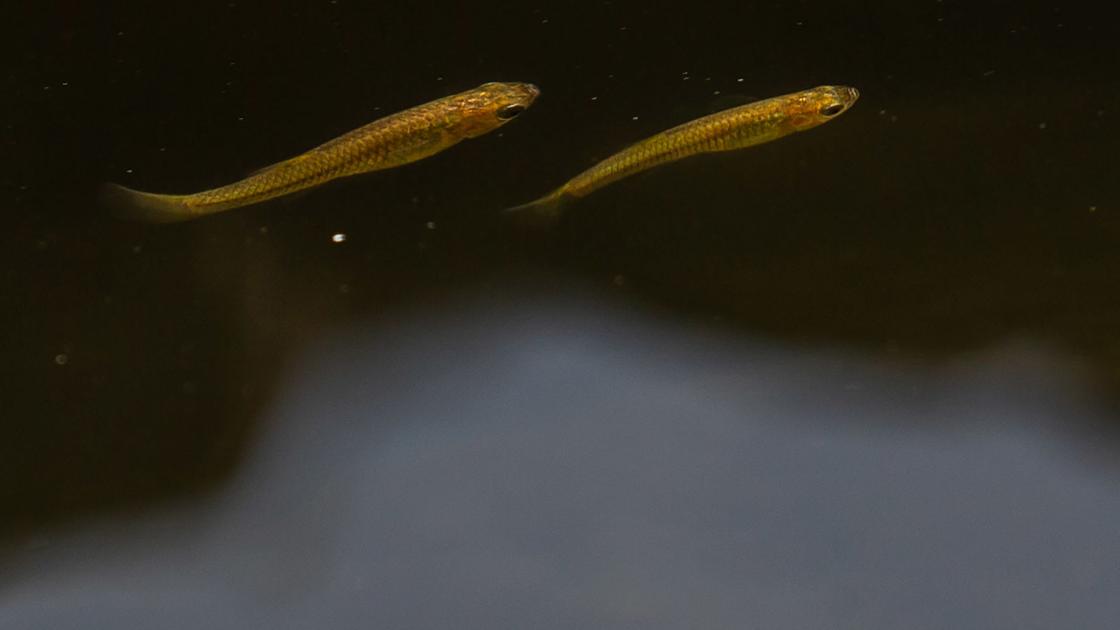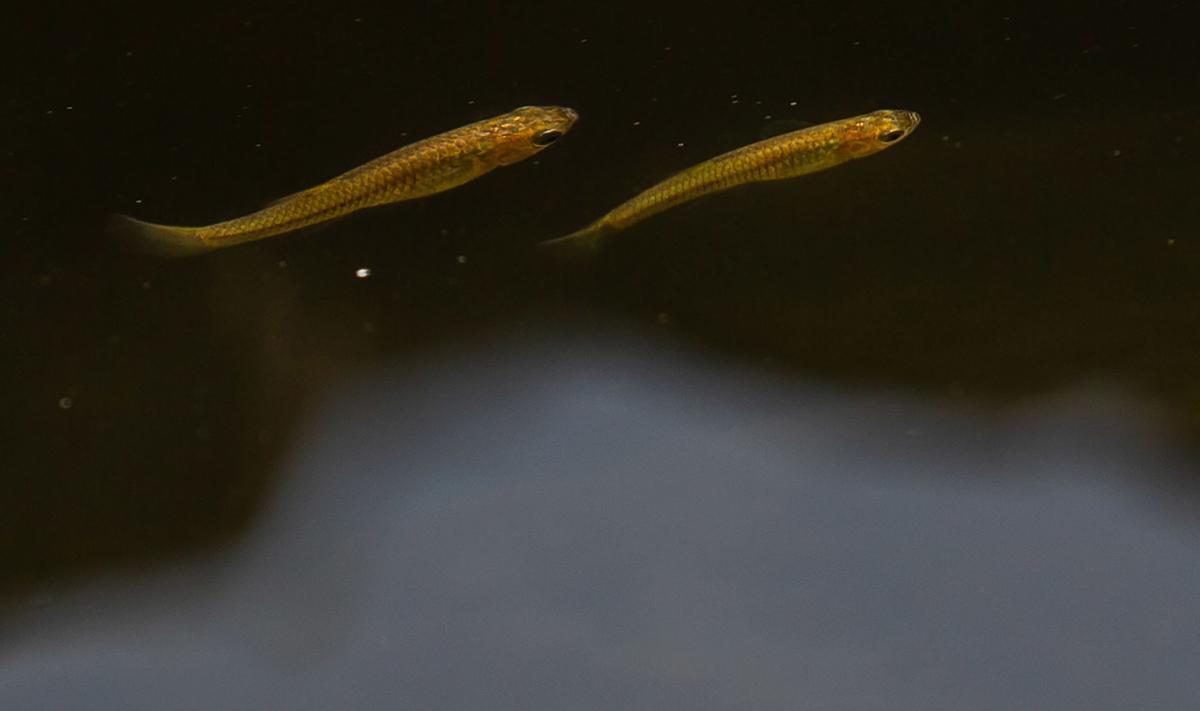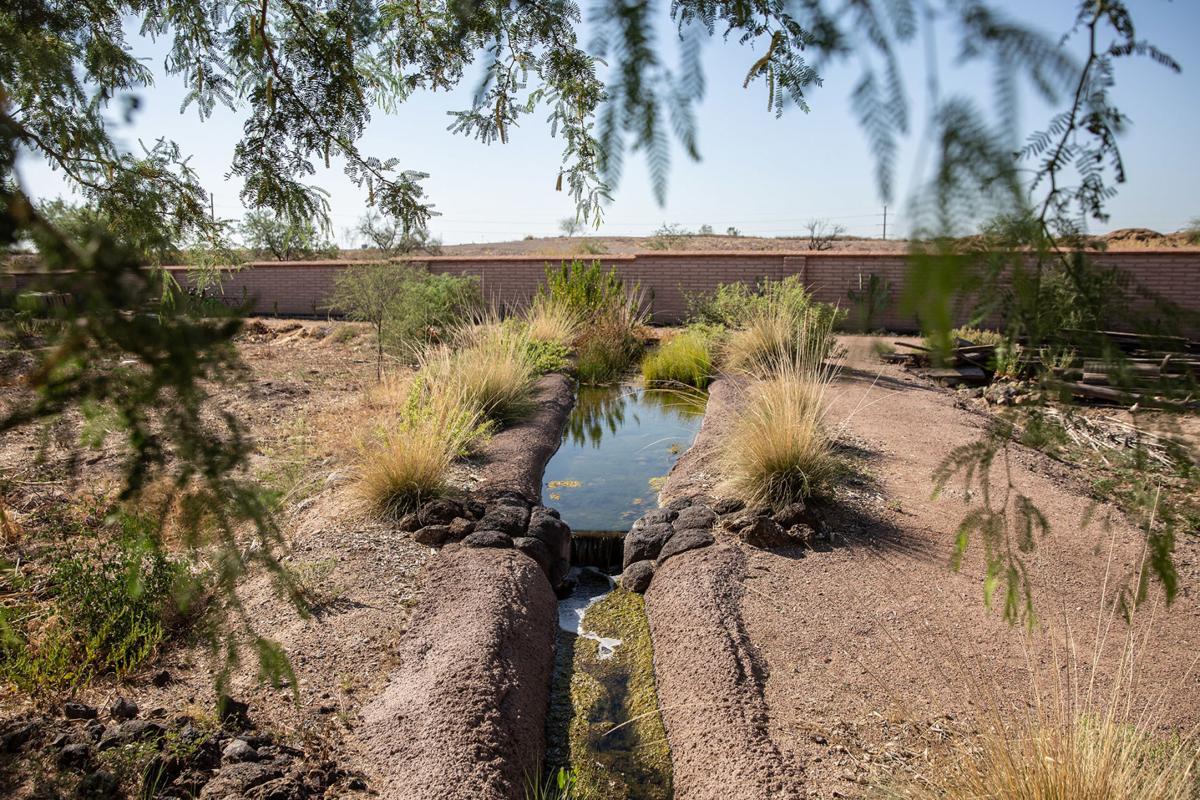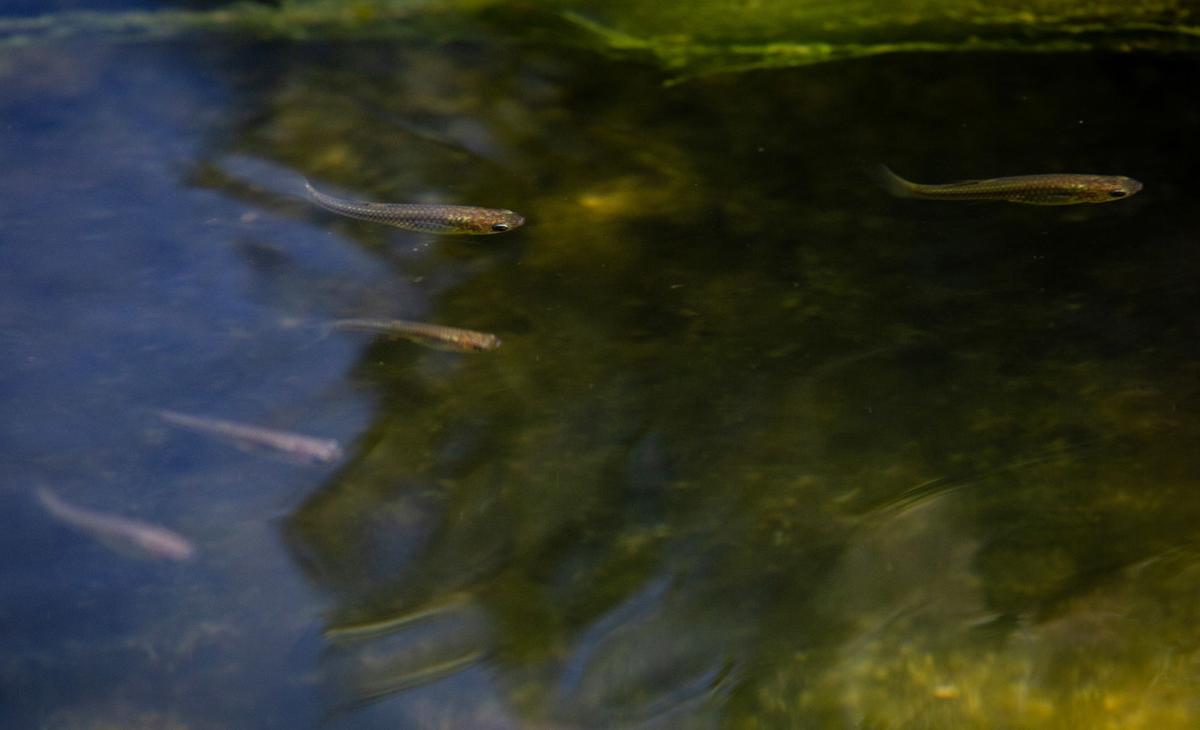
Today, you can see hundreds of inch-long, endangered Gila topminnows swimming furiously in an irrigation canal through Mission Garden, a replica of early Tucson-area farms.
Starting late this fall, you could well see such minnows in the newly revived stretch of Santa Cruz River through downtown, too.
The state Game and Fish Department is poised to release 500 to 1,000 of the fish into the river once paperwork is wrapped up for an agreement with Tucson and the U.S. Fish and Wildlife Service.
The agreement would free Tucson Water from liability under the federal Endangered Species Act for any fish that would die should it have to turn off the water as it did this spring.
The city has been releasing reclaimed water through its Santa Cruz River Heritage Project since June 2019. But the water was shut off for a couple months for Pima County to remove sediment and trees for flood protection.
The new agreement amounts to what U.S. Fish and Wildlife Service biologist Doug Duncan calls a “get out of jail free card” for Tucson Water. With it, the city won’t be charged with illegal “take” of an endangered species should river fish die, he said.
In return, Tucson Water officials say they will get more flexibility in how they reduce flood risks, better manage groundwater recharge and maintain the reclaimed water system. They also will be able to step up monitoring of environmental and hydrologic conditions in the river and remove invasive species.
This agreement could also lead to the future release of other endangered fish into the river, such as the desert pupfish, Duncan said.
Mission Garden canal has “blossomed”
About 500 Gila topminnows were placed in June 2019 at Mission Garden, into the 400-foot-long, concrete acequia at the garden near “A” Mountain.
Mission Garden, on county-owned land near downtown, is a nonprofit, 4-acre replica of how 4,000 years of agriculture developed around Tucson. The acequia was installed to show how prehistoric and historic peoples here got water to their crops.
The minnow release appears to be a big success. On June 25, county biologists captured 1,305 topminnows in mesh traps to count them before putting them back. They were baited with dog food, a delectable treat for the fish.
“A walk along the length of the canal made clear that the topminnow appeared to be thriving and very prolific, with large numbers of juvenile fish as well as mature individuals. It was especially easy to see the dark black males courting the longer and bulkier females near the water’s surface,” wrote Ian Murray, a county conservation science program manager, in a memo afterward.
“The acequia at Mission Garden is brimming with life and contributing to the conservation of endangered species,” Murray wrote.
“In the year since the fish were released into the acequia, the vegetation within and adjacent to the canal has blossomed with new growth, creating a lush oasis, including some prolific growth of the endangered Huachuca water umbel which had also been planted last year.”
Biologists also saw dragonflies and damselflies, including gaudy orange flame skimmers, dance and circle around the water.
“Several Sonoran desert toads bounced into dense vegetation along the banks, and we saw the shed skin from a checkered gartersnake that has been frequenting the canal.”
Conditions right in the Santa Cruz, too
The Santa Cruz’s habitat has also changed mightily since the reclaimed water was released there in late June 2019. Grasses are densely packed along much of the newly watered river from 29th Street to north of St. Mary’s Road.
The river water now runs 24-7, at nearly 2,000 gallons per minute, north to about halfway between Speedway and Grant Road. Dragonflies, damselflies, numerous birds and mammals are showing up far more than before.
Water conditions are good enough that it’s likely that if Game and Fish didn’t release topminnows into the river, they would show up either naturally, through a big flood bringing them upriver, or by private individuals putting them there, Duncan said.
The fish already live 45 miles upstream of downtown Tucson in the Santa Cruz, below the Nogales International Wastewater Treatment Plant, and on Tucson’s northwest side, below the county’s Aqua Nueva sewage treatment plant, Duncan noted.
Water flows could be interrupted
But besides the shutdown of river flows during the spring for flood control work, Tucson last winter also drastically reduced its releases by three-fourths for several months. That was to prevent the water from seeping so fast that the underlying aquifer would rise enough to undercut a nearby landfill.
Other unexpected events that could force shutdowns of river flows would be a break in the reclaimed water line, mechanical problems or high demands for the reclaimed water from its other customers, Tucson Water officials said.
“We don’t have any plans to turn the water off again in the foreseeable future,” they said.
But even if the water is cut and the fish population “winks out,” a topminnow release this fall would still provide valuable public education, offering a “net conservation benefit,” biologist Duncan said.
Releases have helped imperiled species
An official release into the river downtown would be the latest in a long series of releases of the endangered Gila topminnows in Southeast Arizona into artificially constructed ponds, canals, tanks and other water bodies, due to agreements between governments and private entities.
As many as 10,000 of the tiny minnows have been released throughout Southern Arizona through such agreements, said Mark Hart, an Arizona Game and Fish spokesman.
While virtually every other activity associated with the Endangered Species Act is drowning in controversy, this new Safe Harbor agreement has none so far. The Tucson-based Center for Biological Diversity, which opposed some such agreements in the past, endorses this one.
“The pupfish and topminnow are doing fairly well but need more streams which haven’t been invaded by non-native fish to fully recover. There are precious few such streams left,” said Kieran Suckling, the center’s director.
“The city should be congratulated for having the foresight and caring to create one.”
"Mustang Stampede"

Maddy Jacobs, 7, middle, reaches for her remote learning tool kit from her teacher, Kris Green, as her friend, Carly Kupinski, 6, watches during a "Mustang Stampede" at Manzanita Elementary School for the first day of school on August 17, 2020.
First Day of School, John B. Wright Elementary

Augusta Iranzi, center, attends his teachers online class while monitors Jasmine Phillip, left, and Nadifo Yusuf, watch students inside a classroom at John B. Wright Elementary School, 4311 E. Linden St., in Tucson, Ariz. on August 17, 2020. About 10 students came to school for online instruction under the guidance of classroom monitors.
"Mustang Stampede"

Lily Baser, 8, identifies herself for easy remote learning tool kit pickup during a "Mustang Stampede" at Manzanita Elementary School for the first day of school on August 17, 2020.
"Mustang Stampede"

Krista Westmoreland, left, a third grade teacher, shows the remote learning tool kit of a student to Anna Ames, music teacher, during the "Mustang Stampede" at Manzanita Elementary School for the first day of school on August 17, 2020.
"Mustang Stampede"

Maya Brown, 9, rides in style for her remote learning tool kit pickup during a "Mustang Stampede" at Manzanita Elementary School for the first day of school on August 17, 2020.
"Mustang Stampede"

Multiage teachers Kris Green left, and April Pollow greet and cheer on their students during a "Mustang Stampede" at Manzanita Elementary School for the first day of school on August 17, 2020.
"Mustang Stampede"

Maddy Jacobs, 7, left, waves to her teacher as she stands in the sunroof with her friend, Carly Kupinski, 6, during a "Mustang Stampede" to pickup their remote learning tool kit at Manzanita Elementary School for the first day of school on August 17, 2020.
"Mustang Stampede"

For the first day of school teachers at Manzanita Elementary School greeted their students during a "Mustang Stampede" and handed out remote learning tool kits on August 17, 2020.
"Mustang Stampede"

Kim Boling, principal at Manzanita Elementary School, greets her students and parents with a mustang during the "Mustang Stampede" for the first day of school on August 17, 2020.
First Day of School, John B. Wright Elementary

Yarani Martinez gives a monitor a thumbs up to inform the monitor that his online class is working after classes began at John B. Wright Elementary School, 4311 E. Linden St., in Tucson, Ariz. on August 17, 2020. About 10 students came to school for online instruction under the guidance of classroom monitors.
First Day of School, John B. Wright Elementary

Alice Flores, right, watches as her grandson Jesus Silva is escorted to the cafeteria before classes began at John B. Wright Elementary School, 4311 E. Linden St., in Tucson, Ariz. on August 17, 2020. About 10 students came to school for online instruction under the guidance of classroom monitors.
First Day of School, John B. Wright Elementary

Augusta Iranzi follows the directions on the floor while being escorted to a classroom at John B. Wright Elementary School, 4311 E. Linden St., in Tucson, Ariz. on August 17, 2020. About 10 students came to school for online instruction under the guidance of classroom monitors.
Subscribe to our Daily Headlines newsletter.
August 18, 2020 at 04:30AM
https://ift.tt/31afZCF
Endangered fish headed for Santa Cruz River in downtown Tucson - Arizona Daily Star
https://ift.tt/35JkYuc
Fish



No comments:
Post a Comment